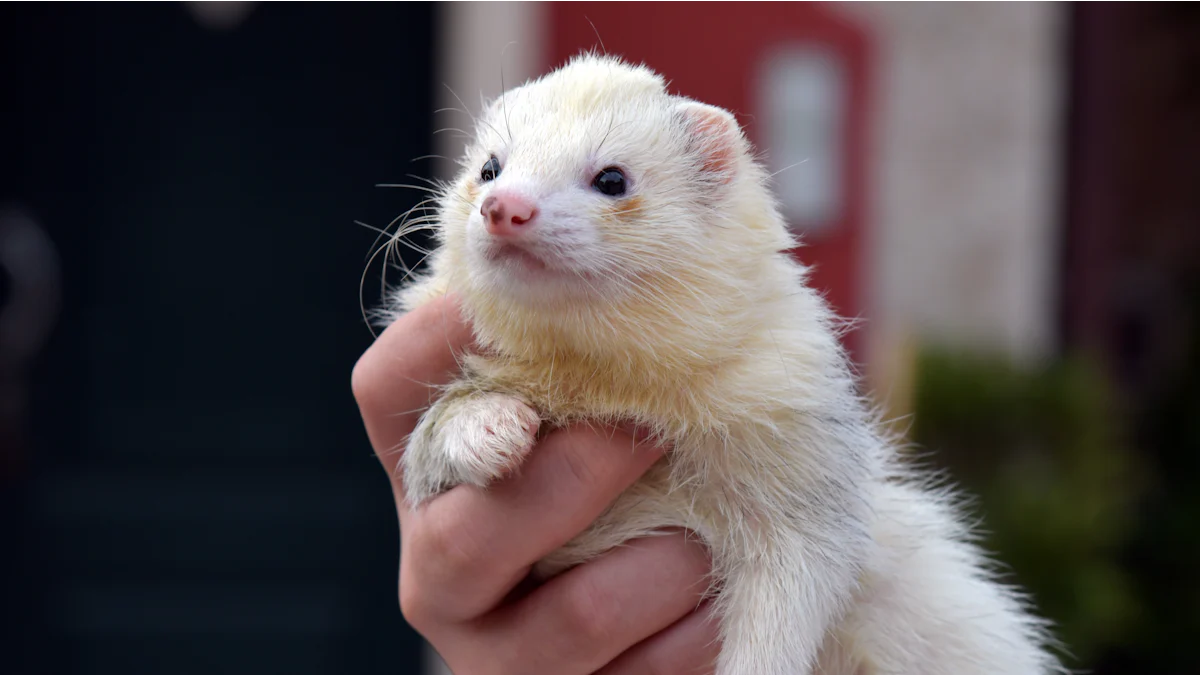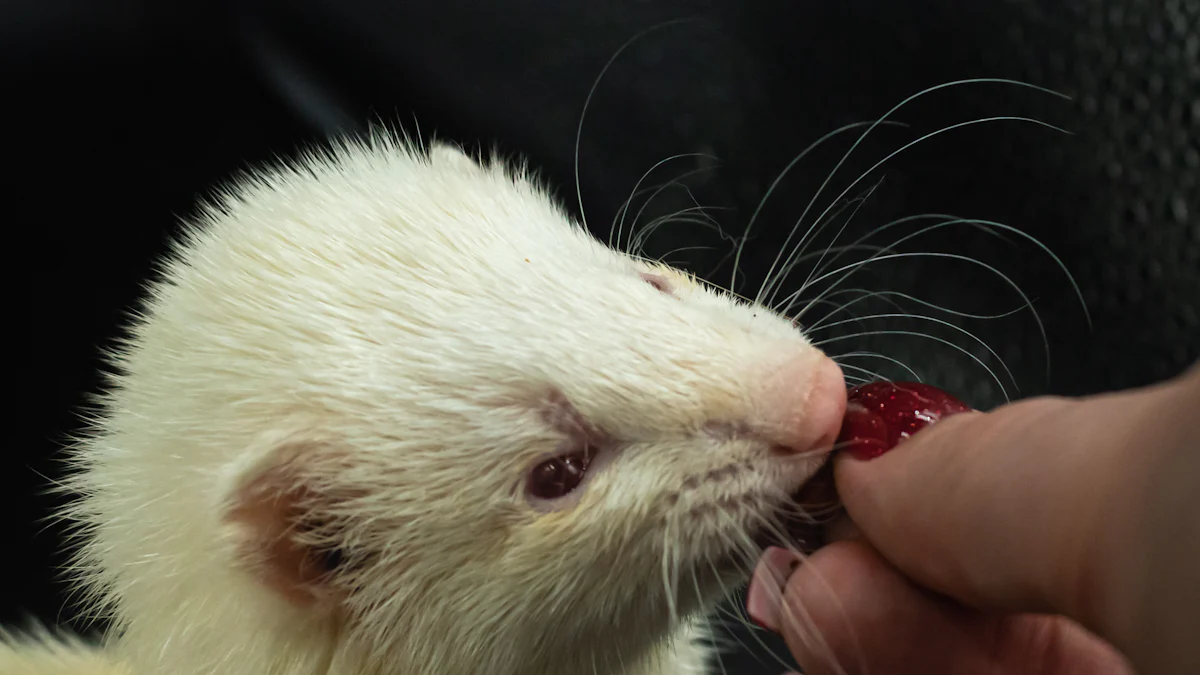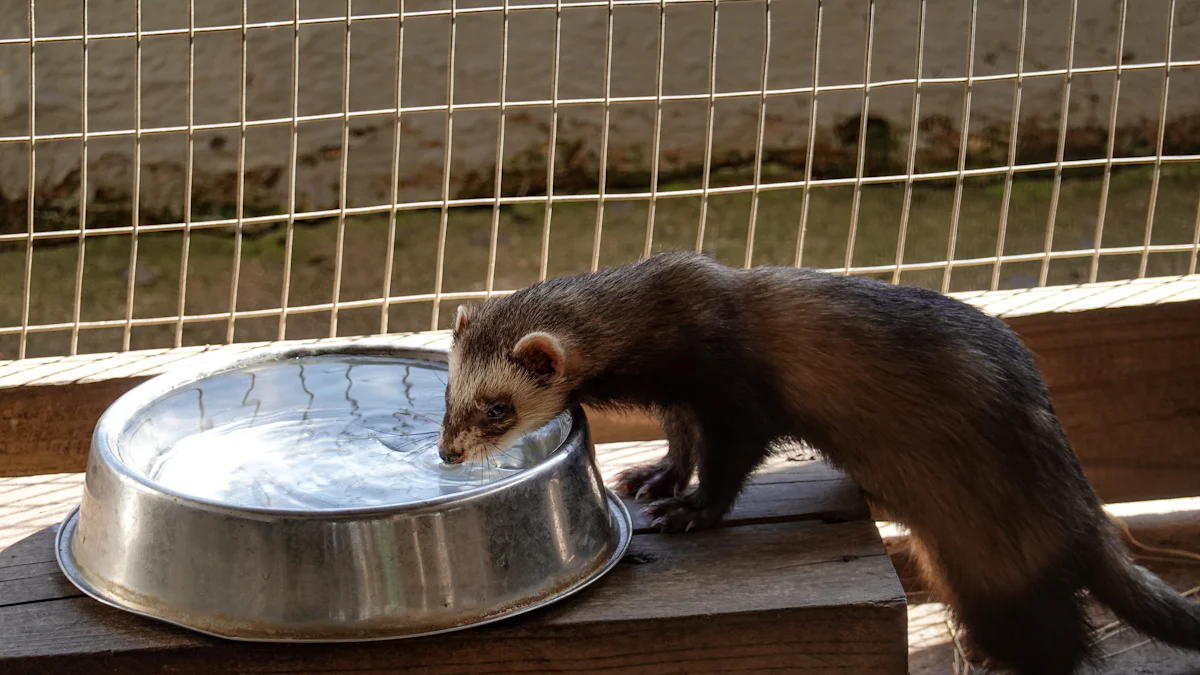
Ferrets are lively, curious pets with unique dietary needs. They thrive on high-protein, high-fat diets, as shown below:
| Nutrient | Percentage by Dry Matter |
|---|---|
| Protein | 30-35% |
| Fat | 15-30% |
Mealworms ferrets eat as treats fit these needs perfectly. Packed with protein and healthy fats, mealworms support muscle growth, energy, and a shiny coat. However, moderation is key since their high fat content can lead to weight issues if overfed.
Key Takeaways
- Feed mealworms as an occasional treat—limit to one or two a few times a week to prevent health issues.
- Monitor your ferret for any signs of allergies or digestive discomfort when introducing mealworms to their diet.
- Always choose high-quality mealworms from reputable suppliers to ensure safety and nutritional value.
Are Mealworms Safe for Ferrets?
Can ferrets digest mealworms?
Ferrets can digest mealworms, but their bodies treat them as snacks rather than full meals. Mealworms provide protein and essential fatty acids, which support muscle growth and a healthy coat. However, their high fat content means they should only be given occasionally. Ferrets process insects like mealworms differently from their regular kibble or raw food. Feeding kibble and mealworms at the same time may slow digestion and cause discomfort. To avoid this, owners should offer mealworms at a separate time from their main meals.
When fed in moderation, mealworms ferrets eat can complement their diet. A few mealworms, about five or six at a time, are enough to satisfy their nutritional needs without overloading their system.
Precautions for feeding mealworms to ferrets
Mealworms are safe for ferrets when owners follow a few precautions. First, mealworms should only be a treat, not a replacement for high-quality ferret food or other protein sources. Offering one or two mealworms a few times a week is sufficient. Second, it’s important to monitor ferrets for any adverse reactions, such as changes in behavior or digestion issues, when introducing mealworms.
Choosing the right type of mealworms is also crucial. Freeze-dried or live mealworms from reputable sources are the safest options. Processed or flavored mealworms should be avoided, as they may contain harmful additives. By following these steps, owners can ensure mealworms ferrets eat remain a safe and enjoyable treat.
Nutritional Benefits of Mealworms for Ferrets

Protein and fat content in mealworms
Mealworms pack a powerful nutritional punch, making them a great occasional treat for ferrets. They contain about 50 to 60 percent protein, which is essential for muscle development and energy. Ferrets, as obligate carnivores, thrive on high-protein diets, and mealworms align perfectly with this need. The fat content in mealworms also supports a ferret’s high metabolism. However, moderation is crucial since excessive fat can lead to weight gain.
Ferrets require a diet with 20 to 23 percent fat to maintain their energy levels and overall health. Mealworms fit within this range, offering essential fatty acids that promote healthy skin and a shiny coat. While mealworms ferrets eat provide these benefits, they should never replace a balanced diet of high-quality ferret food or raw meat.
How mealworms complement a ferret’s diet
Mealworms add variety to a ferret’s diet while delivering key nutrients. Their high protein content supports muscle growth and keeps ferrets active and playful. The fats in mealworms contain essential fatty acids that improve coat quality and skin health. Additionally, mealworms provide small amounts of vitamins and minerals that enhance a ferret’s overall well-being.
Some of the nutrients mealworms offer include:
- Protein for energy and muscle development.
- Fats that fuel a ferret’s metabolism.
- Vitamin B12 for nerve function and Vitamin D for calcium absorption.
- Minerals like zinc and selenium, which boost immune health.
By feeding mealworms occasionally, owners can diversify their ferret’s diet and provide a tasty, nutritious treat. However, it’s important to balance these treats with a primary diet of ferret food or raw meat to meet all their dietary needs.
Risks and Considerations of Feeding Mealworms to Ferrets
Overfeeding and its consequences
Overfeeding mealworms can cause serious health problems for ferrets. These insects are high in unsaturated fats, which can lead to obesity if given too often. Ferrets have small bodies and fast metabolisms, so even a little extra fat can add up quickly. Digestive issues may also occur when ferrets consume too much protein or fat at once. Signs of trouble include diarrhea, bloating, or a lack of appetite.
To avoid these problems, owners should treat mealworms as an occasional snack rather than a regular part of their diet. A few mealworms once or twice a week is plenty. Monitoring a ferret’s weight and overall health can help catch any issues early.
Allergies or digestive issues in ferrets
Some ferrets may have allergies or sensitivities to mealworms. Symptoms like itching, sneezing, or upset stomachs could indicate a problem. When introducing mealworms for the first time, owners should start with a small amount and watch for any unusual reactions. If a ferret shows signs of discomfort, it’s best to stop feeding mealworms and consult a veterinarian.
Ferrets also have sensitive digestive systems. Mixing mealworms with other foods, like kibble, can sometimes cause stomach upset. Offering mealworms separately helps reduce this risk.
Importance of sourcing safe mealworms
Not all mealworms are safe for ferrets. Some may contain harmful chemicals or pesticides if they’re not sourced properly. Owners should only buy mealworms from reputable suppliers who guarantee their products are free from additives. Live, dried, or frozen mealworms can all be safe options, but they must be clean and fresh.
Avoid flavored or processed mealworms, as these often contain ingredients that are harmful to ferrets. By choosing high-quality mealworms, owners can ensure their pets enjoy a safe and nutritious treat.
Feeding Mealworms to Ferrets

Portion sizes and feeding frequency
Mealworms should always be a treat, not a staple in a ferret’s diet. These protein-packed snacks are best given sparingly to avoid health issues. A good rule of thumb is to offer one or two mealworms a few times a week. This keeps them as a special treat while preventing overfeeding.
Ferrets have small stomachs and fast metabolisms, so even small portions can make a big difference. Overfeeding mealworms can lead to weight gain or digestive problems. By sticking to occasional feeding, owners can ensure their ferrets enjoy the benefits of mealworms without any risks.
Choosing between live, dried, or frozen mealworms
When it comes to mealworms, ferret owners have several options: live, dried, or frozen. Each type has its pros and cons. Live mealworms are the most natural choice and can stimulate a ferret’s hunting instincts. However, they require proper storage and handling to ensure safety.
Dried mealworms are convenient and have a longer shelf life. They’re easy to store and serve, but they may lose some nutrients during the drying process. Frozen mealworms are another safe option, as freezing kills any potential parasites. Owners should thaw frozen mealworms before feeding to avoid upsetting their ferret’s stomach.
No matter the type, it’s crucial to source mealworms from reputable suppliers. High-quality mealworms ensure ferrets get a safe and nutritious treat.
Introducing mealworms to a ferret’s diet
Introducing mealworms to a ferret’s diet requires a gradual approach. Start by offering a few mealworms as treats between regular meals. This helps ferrets adjust to the new food without overwhelming their digestive system.
Keep an eye on your ferret for any signs of discomfort, such as diarrhea or changes in behavior. If everything seems fine, continue offering mealworms occasionally. Avoid mixing mealworms with other foods, like kibble, to reduce the risk of digestive upset.
For the best results, follow these steps:
- Offer mealworms as a treat rather than a primary food source.
- Observe your ferret for any adverse reactions when introducing mealworms.
- Choose freeze-dried or live mealworms from reputable sources.
By taking it slow and monitoring your ferret’s response, you can safely add mealworms to their diet.
Mealworms can be a nutritious and enjoyable treat for ferrets when offered in moderation. These insects provide high protein and essential fatty acids that support muscle growth, energy, and a shiny coat. However, they should never replace a ferret’s primary diet of high-quality ferret food or other protein sources.
🐾 Key Takeaways for Ferret Owners:
- Treat mealworms as an occasional snack—one or two a few times a week is enough.
- Monitor your ferret for any adverse reactions when introducing mealworms.
- Always source mealworms from reputable suppliers to ensure safety.
- Balance mealworms with a well-rounded diet to meet all nutritional needs.
By following these guidelines, ferret owners can safely include mealworms in their pet’s diet. Always consult a veterinarian if you notice any unusual reactions or have concerns about your ferret’s health. 🦴
FAQ
Can ferrets eat other insects besides mealworms?
Yes, ferrets can eat insects like crickets and earthworms. These should be occasional treats, just like mealworms, and sourced from safe, reputable suppliers.
What other treats can ferrets enjoy?
Ferrets love cooked eggs, cooked meat, and Wysong Dream Treats. These options, along with whole insects, provide variety while meeting their nutritional needs.
Should mealworms replace ferret food?
No, mealworms should never replace ferret food. High-quality ferret food or kitten food provides the balanced nutrition ferrets need for long-term health.


